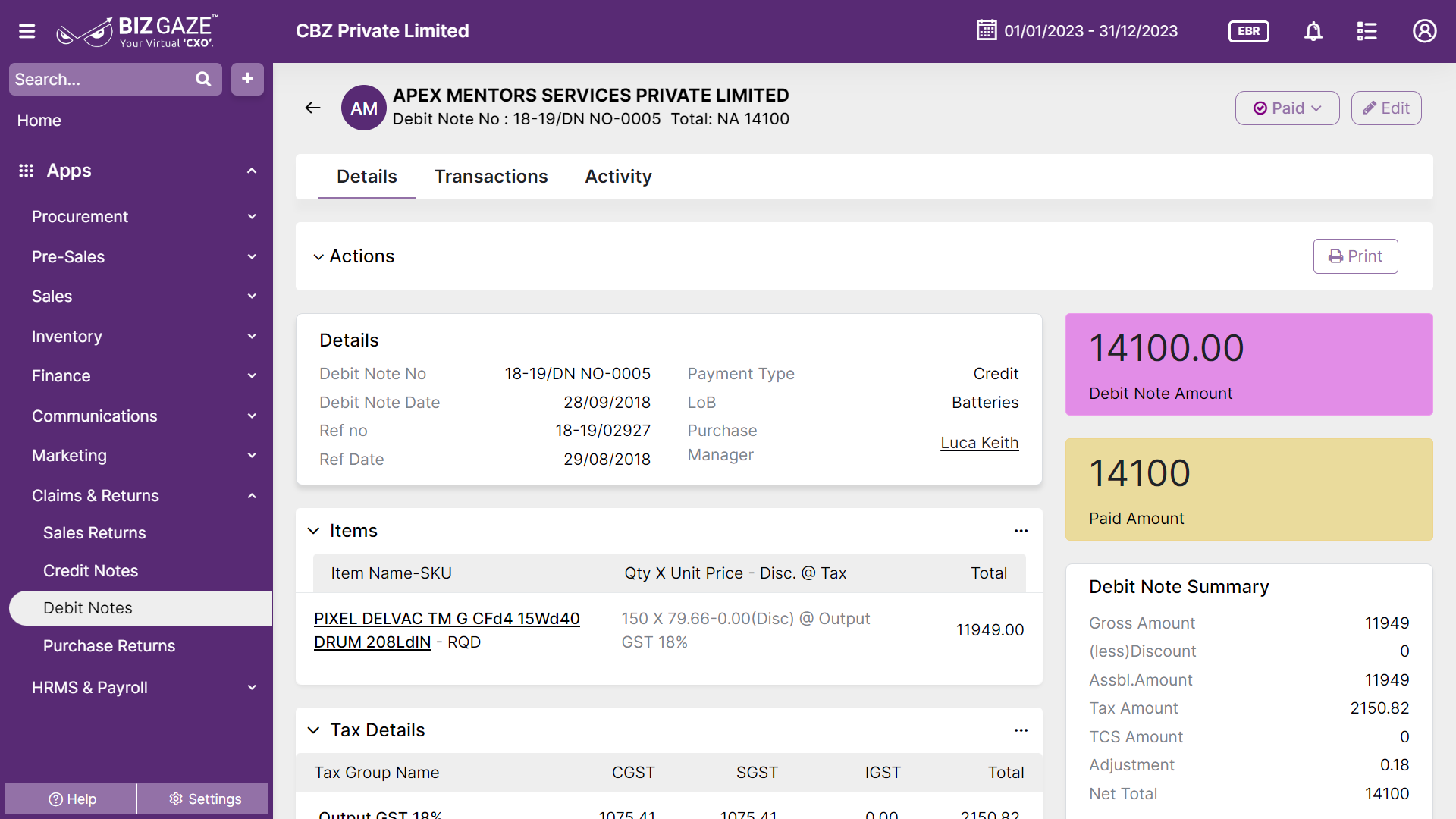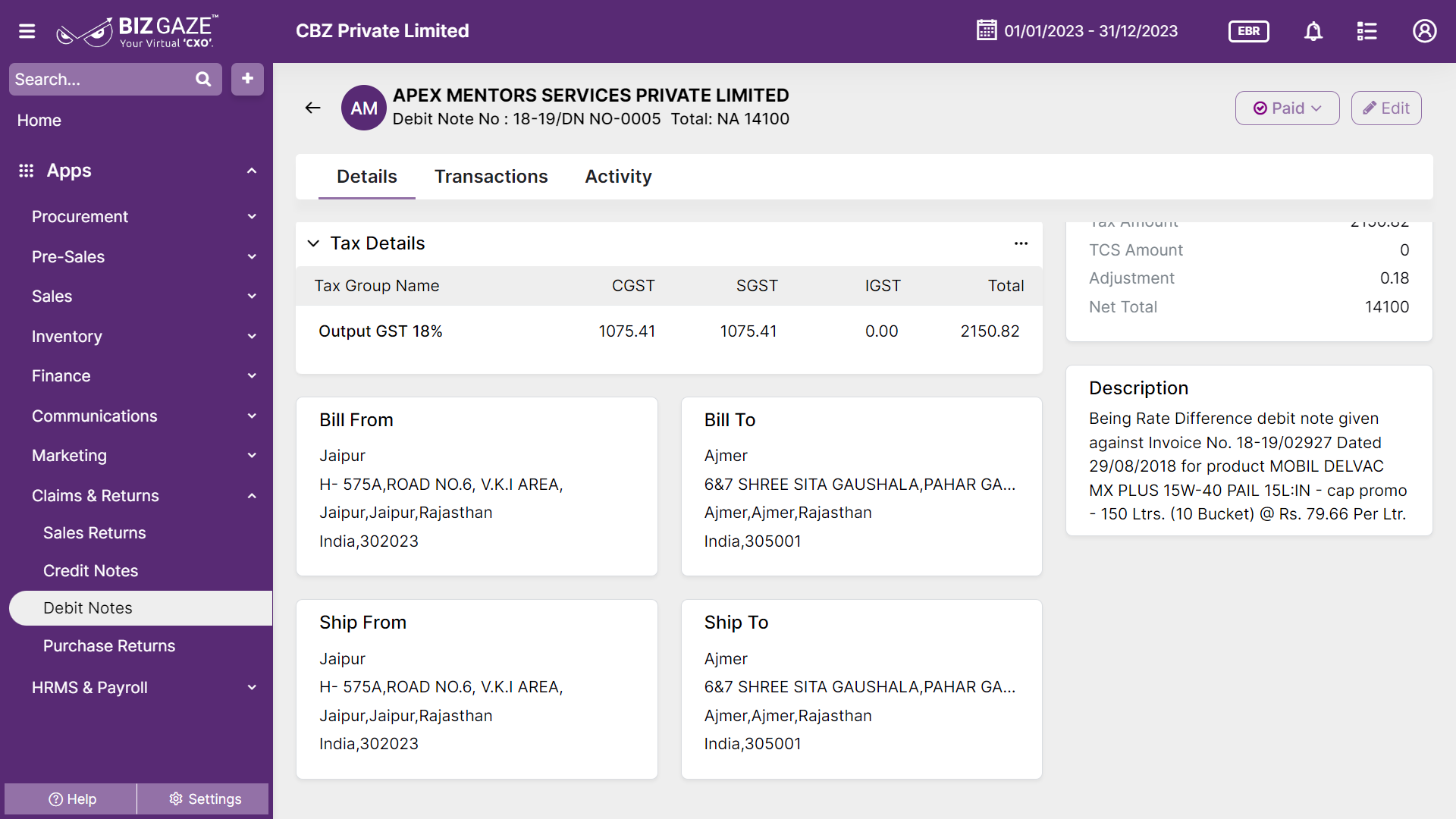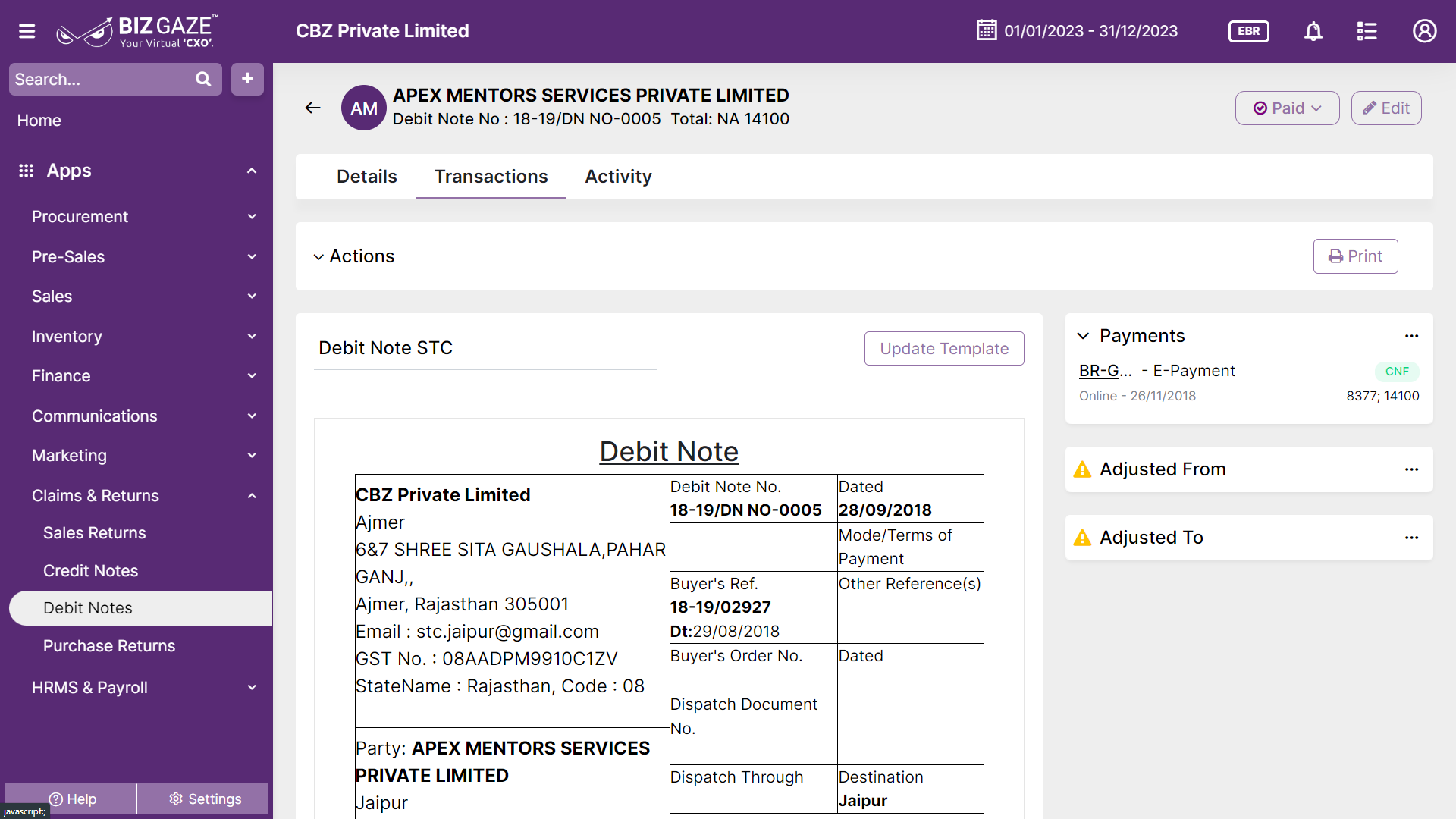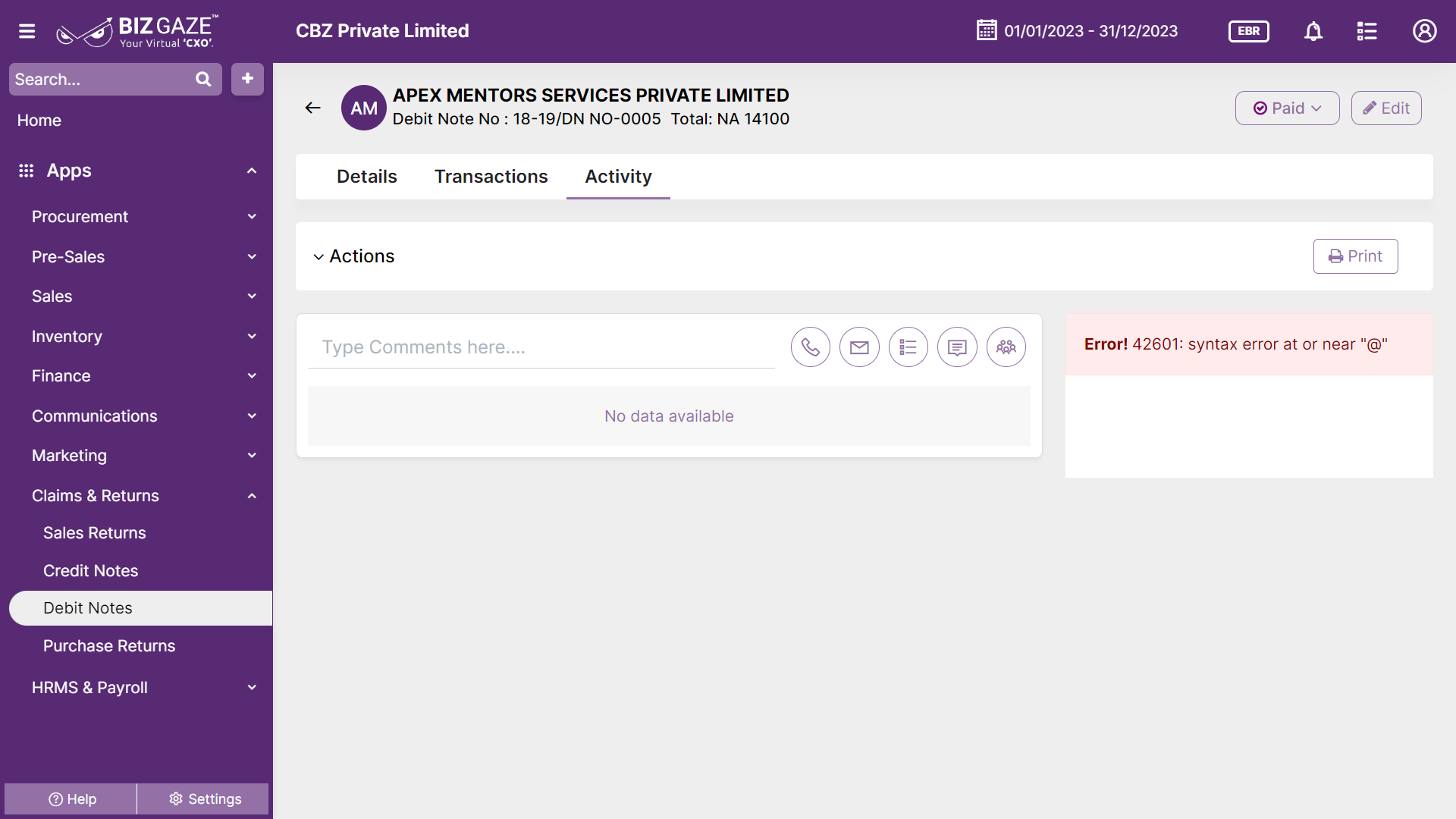Introduction
The Debit Note is applicable for only Vendors. Ideally, a debit note is generated for the purchased goods invoice, if the vendor returns any goods and expects an equivalent amount for the returned goods. The invoice amount is adjusted, the remaining amount will be saved as a debit note amount into the vendor wallet. The debit note can also be generated for complementary goods.
Stage Workflow
Default stages in Debit Notes App:
| Stage name | Description |
| Draft | The debit note is generated, but not submitted. |
| Active | The debit note is submitted but not yet approved. |
| Confirmed | The debit note is approved. |
| Partially Paid | The amount is partially paid by the seller. |
| Paid | The amount is fully paid by the seller. |
| Void | The debit note is deleted or rejected by the manager. |
Portlets & widgets
In the layout view, a Portlet accurately represents each functionality, and its corresponding data is precisely viewed as a Widget. The following section includes the default portlets and widgets of the Debit Notes App.
This section contains the Tax details, item details, Debit Note value summary, billing address, and shipping address
Debit Note Details
This Widget contains Debit Note details such as the name of the seller and the buyer, the date of issue, the reason for issuing the Debit note, the original invoice number.
| Field name | Description |
| Debit Note no. | A Debit Note number is a unique identifier assigned to a Debit Note that helps to track and manage the transaction. It refers to the system generated series for the Debit Note. |
| Placed on | It refers to the date when the Debit Note is created. It is important for tracking purposes and helps determine the expected delivery timeline |
| Due date | It refers to the date by which the payment amount owed by the buyer to the seller. It is the deadline for payment, and failure to make payment by this date may result in late fees, penalties, or other consequences. |
| Ref no | Ref No refers to the unique identification number generated by default for which Debit Note is created. |
| Ref date | Displays the reference date of the Debit Note that helps in quick identification |
| LoB | LoB refers to the specific industry segment or product category associated with the transaction. It is useful for managing and tracking sales data and inventory related to different product lines or divisions within a company. |
| Payment type | Displays payment mode of the transaction. Payment type refers to the method the Vendors makes payment for the goods or services received like cash, credit, debit, bank transfers, or digital wallets. |
| Payment term |
1.Payment term refers to Specific term of days or Period for which the Invoice due to be cleared. If the Payment Term Exceeds penalties/ Discount can be applied for Late & early Payments 2.User can select the payment term manually or will be loaded by default based on the Payment Term rules Configured |
| Created By | Displays the name of the user who created the Debit Note. It refers to the individual or entity responsible for initiating and completing the Debit Note. |
| Field name | Description |
| Debit Note Amount | The total value of the debit note, which represents the additional amount that the buyer owes the seller as a result of the Debit Note. The Debit Note amount can be equal to or greater than the original invoice amount, depending on the reason for issuing the Debit Note. |
| Paid Amount | It refers to the amount that the buyer has already paid towards the original invoice before the Debit Note was issued. The buyer must pay the remaining amount owed after the Debit Note has been applied to the original invoice. |
| Clearance Amt | It refers to the net amount owed by the buyer to the seller after the Debit Note has been applied to the original invoice. It is the amount that the buyer is required to pay to the seller after adjusting for the additional charges or expenses mentioned in the Debit Note. |
Debit Note Value summary
A Debit Note value summary provides a comprehensive overview of the total cost of the order, including all the items purchased, their individual costs, and any additional charges such as taxes, discounts, and shipping fees.
| Field name | Description |
| Gross Amount | Gross Amount refers to the total amount of money or value of a transaction before any deductions or expenses are taken into account. It includes all charges, fees, taxes, and other costs associated with the transaction. |
| Discount | Total discount value given on the item. The “Discount on Items” value is loaded automatically. |
| Total Tax amount | Total Tax Amount refers to the sum of all taxes that are applicable to a transaction or purchase. |
| Assebl. amount | Assessable Amount refers to the before tax and after discount amount. |
| TCS amount | TCS amount applied is displayed. Tax Collected at Source (TCS) is a tax payable by a seller which he collects from the buyer at the time of sale of goods. |
| Adjustment | Adjustment amounts made from the wallets |
| Net Total | Net Total refers to the final amount that remains after all deductions, discounts, taxes, and other charges have been subtracted from the Gross Amount. It is the actual amount that a Vendor is required to pay for a product |
Items
Item section contains details about the items that are returned, which means that the item was returned back to the person who has shipped the product. This widget shows the Items with Qty, Price, Discount & Tax selected to create the Debit Note
| Field name | Description |
| Item name | Item name refers to the name or title of a product, service, or item that is being offered for sale or purchase. It is typically used to describe the product or item in a concise and clear manner, so that Vendors can easily understand what it is and what it does. |
| SKU | Displays SKU code of the item. A SKU, which stands for Stock Keeping Unit, is a unique identifier for each of the products that makes it easier to track inventory |
| Quantity | Quantity refers to the numerical value that represents the number of items, products, or units that are being purchased or sold in a transaction. It is the total number of units of a product or service that a Vendors is ordering or a seller is providing. |
Billing and shipping address
| Field name | Description |
| Bill To | Billing Address refers to the address where a Vendor receives their billing statements or invoices for goods or services they have purchased. |
| Ship To | Ship To address refers to the physical location where a package or item is intended to be delivered. It typically includes the recipient’s name, street address, apartment or unit number (if applicable), city, state or province, zip or postal code, and country |
| Bill From | Sold By refers to the entity or business that is offering a product or service for sale. It could be the manufacturer, distributor, retailer, or a third-party seller. |
| Ship From | Ship from refers to the location or origin from where a product or package is being shipped or sent to its destination. It is the physical address or location where the product is being dispatched from. |
Tax details
Tax details refer to the information related to taxes that are applied to a transaction, such as the sale of goods or services. Tax details are usually included in invoices or other financial documents to ensure proper calculation, reporting, and payment of taxes as required by law.
This widget shows the Tax calculated for the Items in Debit Notes
| Field name | Description |
| Tax Group name | Tax group name is displayed. A tax group facilitates collecting more than one set of taxes under a single set of rules. |
| CGST | Displays CGST (Central Goods and Services Tax) tax amount on the invoice. The GST to be levied by the Centre on Intra state supply of goods and / or services is Central GST (CGST) |
| SGST | Tax amount of SGST (State Goods and Services Tax) in the invoice. The GST to be levied by the State on Intra state supply of goods and / or services is State GST (SGST) |
| IGST | IGST (Integrated Goods and Services Tax) tax amount added in the invoice is displayed. On supply of goods and services outside the state, Integrated GST (IGST) will be collected by Centre. |
Description
| Description | Displays comments or short notes about the Debit Note details |
This section contains transaction details of the Debit Note created. A transaction is an event or action that involves the exchange of goods, services, or financial assets between two or more parties.
Payments
Details related to payments in Debit Note like payment number, payment date, total amount, payment mode and total invoice amount are displayed.
Adjusted From & Adjusted To
| Field name | Description |
| Adjusted From | This widget shows the Amount from which the Payment amount is adjusted in invoices (From the wallets amount can be adjusted to invoices) |
| Adjusted To | This widget shows the Payment amount that is adjusted with respect to the Invoices. |
Activity Log provide users with essential information, notifications, and real-time updates to keep them engaged and informed about key activities in apps related to updates, notifications, and stage changes.
| Field name | Field Description |
| Comments | User can write short notes or comments about the Debit Note |
| Audit | |
| Created Date | The date when the Debit Note is created |
| Created By | The name of the person who created the Debit Note |
| Last Updated Date | The last stage changed of the Debit Note |
| Last Updated By | The name of the person who last updated the stage |
| Status | Displays the current status of the Debit Note |
| Time-Line | This widget tracks all the activities within the app. |
Reports
A report is a document that presents information in an organized format for a specific audience and purpose. Although summaries of reports may be delivered orally, complete reports are almost always in the form of written documents
- Debit Note Master



